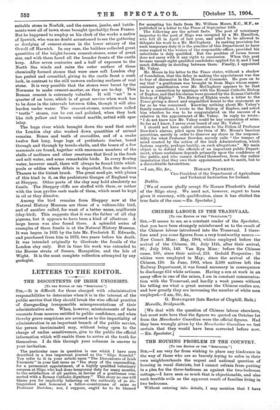LETTERS TO THE EDITOR.
THE DISCONTENTS OF IRISH UNIONISTS.
[To THE EDITOR OF THE "SPECTATOR-1
SID,--4t is difficult for those charged with administrative responsibilities to determine when it is in the interest of the public service that they should break the wise official practice of disregarding irresponsible misrepresentations of their administrative acts. When, however, misstatements of facts emanate from sources entitled to public confidence, and when thereby grave suspicions are aroused as to the impartiality of administration in an important branch of the public service, the person incriminated may, without being open to the charge of undue sensitiveness, give to the public the official information which will enable them to arrive at the truth for themselves. I do this through your columns in answer to your invitation.
The particular case in question is one which I have seen described in a less important journal as the " Sligo Scandal." You refer to it in your article upon "The Discontents of Irish TJnionists" in your last issue as "the story of the superseding, for a permanent appointment, of a highly qualified veterinary surgeon at Sligo who had done temporary duty for many months, to the satisfaction of all parties, in favour of a gentleman con- nected with a Roman Catholic dignitary." This story no one will blame you for implicitly believing on the authority of so dis- tinguished and honoured a fellow-countryman of mine as Professor Dowden; nor, I suppose, ought he to be blamed for accepting his facts from Mr. William Moore, K.C., MP., as published in a letter to the Times of September 10th.
The following are the actual facts. The post of veterinary inspector to the port of Sligo was occupied by a Mr. Hamilton, who fell ill in April of last year, and asked to be allowed to delegate his work to a Mr. McCloghery. In making provision for such temporary duty it is the practice of this Department to have some regard to the wishes of the responsible officer, provided his substitute is duly qualified. But the position of locum ten ens does not carry with it any right to succession. When this post became vacant eight qualified candidates applied for it, and I had much difficulty in deciding between them. Finally, I appointed Mr. Vahey.
Mr. Moore in his letter to the Times states, without a shadow of foundation that the delay in making the appointment was due to fear of discussion in the House of Commons. He goes on to say that " a gentleman was brought in from Mayo whose super- eminent qualification over Mr. McCloghery appears to be that he is a connection by marriage with the Roman Catholic Bishop of Ra.phoe, and that his claims were pressed by the Roman Catholic Bishop of Elphin." The Bishop of Elphin wrote a letter to the Times giving a direct and unqualified denial to the statement as far as he was concerned. Knowing nothing about Mr. Vahey's family connections, I wrote to the Bishop of Raphoe, and asked him whether he was to be congratulated on the success of a relative in the appointment of Mr. Vahey. In reply he wrote : " I do not know how Mr. Vahey could be any connection of mine. So far as I know, I never even heard of any Mr. Vahey."
I should not have called attention to the Pelion of Professor Dowden's alarms, piled upon the Ossa of Mr. Moore's baseless assertions, merely in order to disavow my share in the responsi- bility for what Professor Dowden naively calls "the temper of mind created by the action of the Irish Administration, which fastens eagerly, perhaps hastily, on such allegations." My main object is to defend the officials of an important public Depart- ment, whose usefulness depends primarily upon the confidence of the public, and who cannot defend themselves, from the unfair imputation that they owe their appointment, not to merit, but to a discreditable favouritism.
Vice-President of the Department of Agriculture and Technical Instruction for Ireland.
Dublin.
[We of course gladly accept Sir Horace Plunkett's denial of the Sligo story. We need not, however, regret to have given it currency, with qualification, since it has elicited the true facts of the case.—ED. Spectator.]










































 Previous page
Previous page